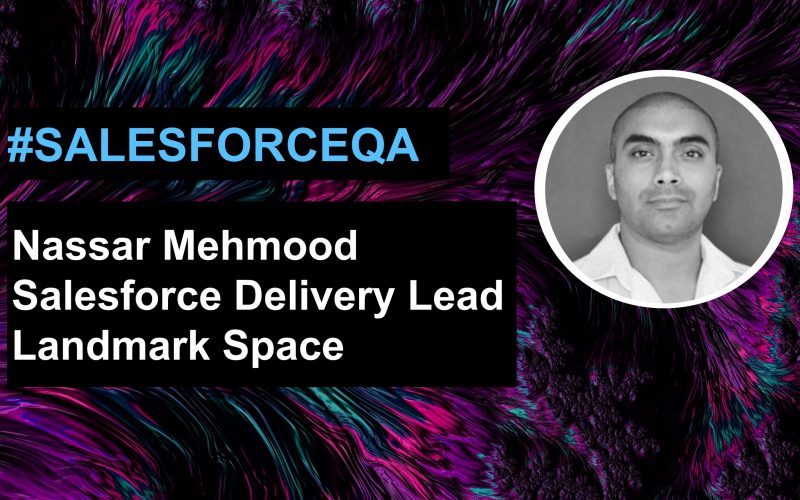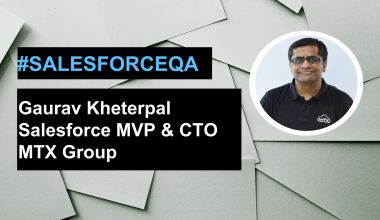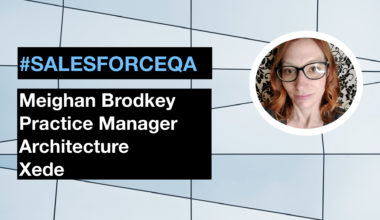In our most recent #SalesforceQA interview, we caught up with Salesforce Delivery Lead at Landmark Space, Nassar Mehmood.
Nassar talks about the biggest challenges he has faced throughout his career and how to overcome these, as well as discussing the steps he takes to continue developing in the ever-changing world of Salesforce. Nassar also discusses the key characteristics needed to succeed in Salesforce.
Salesforce Republic (SR): To kick-off, could you tell us a bit about your career and what interested you about a career in Salesforce?
Nassar Mehmood (NM): My original career path was never Salesforce, I was focused more in IT. I had studied towards being an IT professional. But then I was employed at a charity, working on their network, and when they had to get a CRM, as they had won a grant, I was part of that process. We ended up choosing Salesforce as they offer great value for charities, they give you 10 licenses free of charge, and 50% off their other products, and any app exchange. I was so heavily involved in the process, working closely with the partner consultancy, who down the line actually said to me: “This is where you want to be, Salesforce is going to be massive.” And I stuck with it.
SR: What are some of the biggest challenges you’ve faced throughout your Salesforce career, and how did you overcome these?
NM: I’d say one of the biggest challenges throughout my Salesforce career has been the evolution of the product. Salesforce is constantly evolving and there’s so much to learn. You can study Trailheads, which are really beneficial because they allow you to learn the capabilities of the product and get the most out of it, but because the product changes every quarter it is difficult to stay on top of those product changes. My advice would be to get the skills in the area you are working in solidified, but not to forget that Salesforce is changing, particularly in this climate it is important to stay on top of the industry.
Another challenge I would say, particularly with newer implementations is the need to get the business stakeholders and management on board, I have struggled with this throughout my career. To overcome this, my main piece of advice would be to find that one member of management that values the benefits Salesforce can bring to the organisation and make time to talk with them about it. This isn’t a Salesforce issue, it’s more of a cultural issue around the organization being too set in their ways. To determine the level of involvement with the product, it is important to ask the right questions during the interview process; what are the businesses long term goals for Salesforce? How engaged are they with the product? Those kinds of questions are both important and expected, particularly at the senior level as they also show that you are engaged in the product and your career in Salesforce.
SR: In your experience, what do you think are some of the character traits needed to succeed in Salesforce?
NM: Being able to communicate, I think that’s important, not just about Salesforce but in a language that non-Salesforce professionals would understand. On the flip side of that, listening is also key. Originally, when I started, I was so enthusiastic I wouldn’t listen, I would just jump in and try to answer a question. Over time I learned to listen first, understand the question or the challenge your users are facing, and then give an answer. Especially when you go for more senior roles, within bigger companies, listening is crucial.
Linking back to my previous answer, a key character trait is having the willingness to learn. This is important for staying on top of Trailhead – which is a goldmine. If I don’t know something, I’ll go in there and learn. That’s not to say you should live on it all day, it’s the balance of wanting to learn, but focusing in on learning what is relevant in your career at the time, and not overwhelming yourself with knowledge you might not remember six months down the line, because you don’t use it day-to-day. Honing in on a particular area is also a great way to differentiate yourself. This is where it becomes fundamental to look at how the market is changing and what skills are currently trending, in order to position yourself effectively.
Having a willingness to learn isn’t just about accreditations; I have no certifications; I do Trailhead badges when I need to learn something, but some people learn quicker on the job. Experience is vital, hand-in-hand with certifications is great, but shouldn’t be discounted in itself. Alongside that industry specific experience is also key. I’ve avoided staying in the same industry throughout my career because there’s a limit on what you can learn in each industry. It’s necessary to also remember that certain industries and companies will expect certifications, but don’t let yourself get knocked down if you haven’t got any. In my 14 years, I’ve always been looked at for my experience. Show motivation, show willingness and that will come across in any interview.
A technical characteristic that I think is key to succeeding in Salesforce and should not be discounted, is experience on Excel. For me, data is important. Data is always going to have its challenges but having a good grounding in Excel and software like Data Loader, I think is crucial. It’s kind of forgotten because Salesforce is a cloud system, but never forget data experience.
SR: Salesforce is ever-changing, what are some of the steps you take to ensure that you continue learning about the platform?
NM: Trailhead is a key platform that I use. I have also found that Google is great for Salesforce. But a key thing I use to continue developing with the platform are my peers. I join chatter groups for the products; I make sure to ask questions and engage with these groups, I find this really useful. That’s not to say you should join every group out there as it is easy to get bombarded with information, but definitely join a few. A great way to continue learning about the platform or a particular feature is to get into a sandbox and try it yourself. You’d be surprised what you can pick up by just doing it.
SR: Finally, what emerging trends in Salesforce are you most excited about?
NM: Personally for me, I’d love to learn more about the Salesforce field service, because I love the concept behind it and I can see how companies can be using it to triage their work, managing their deliveries or servicing, whatever it may be.
Another trend I’d like to get more involved with is tableau. I’m not a data person, but I love the end result. It would be interesting to get involved with what the department and management get out of the solution.
I can’t wait for the new Salesforce release that’s come out in winter ’21 around dynamic lightning pages. Customers have been asking for that kind of feature, maybe since it was Classic, so it’s great to see it coming out now.
If you’re a Salesforce professional and would like to be involved in our Q&A series, please get in touch today!


